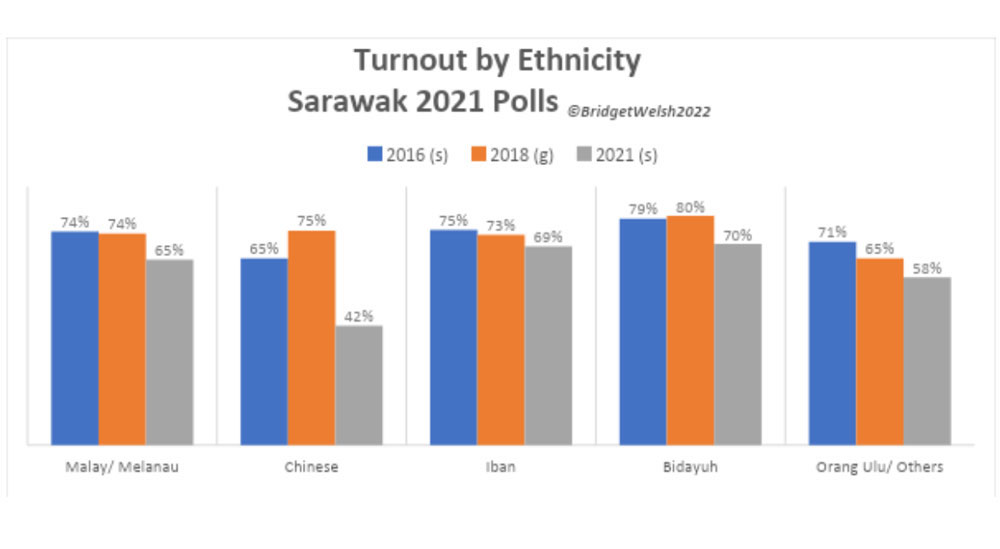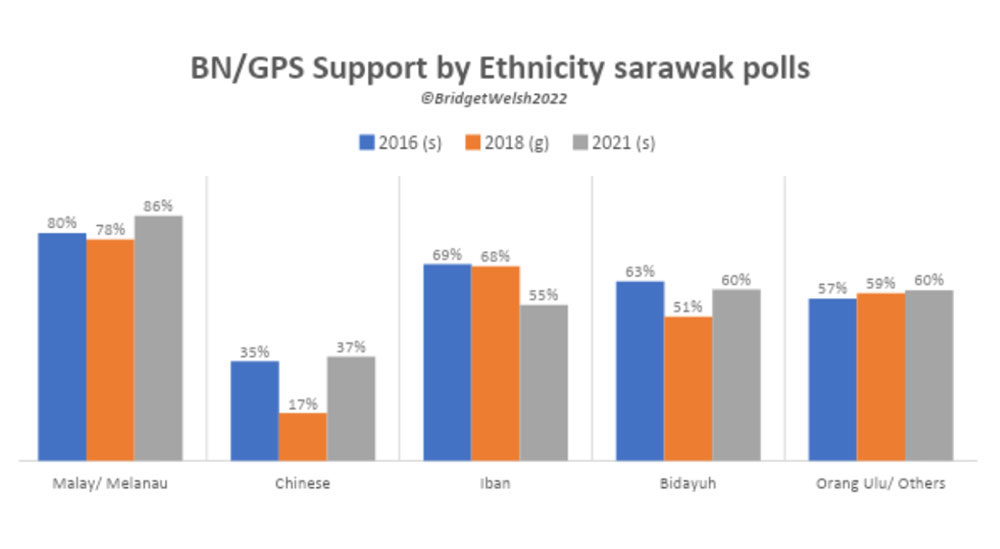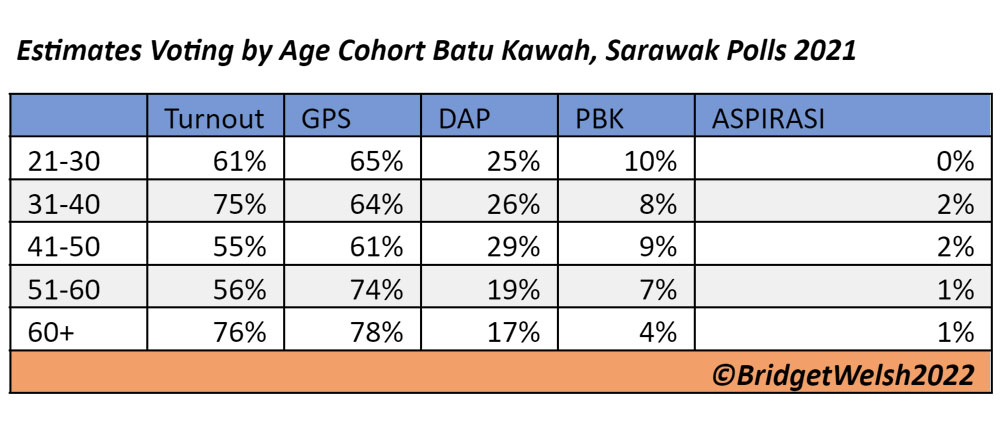(Now) Premier Abang Abdul Rahman Johari Abang Openg’s victory in the Sarawak polls last December was decisive. The Gabungan Parti Sarawak (GPS) coalition he led secured 76 of the 82 seats, a whopping 93% of total seats.
Analysis of the polls brought attention to the rise of state nationalism, his administration’s efforts to promote greater Sarawak autonomy and control of its revenue and the high spending around the campaign.
Others drew attention to the weakness and transformation of the opposition; Pakatan Harapan’s performance was abysmal, with DAP only winning two seats and PKR losing its deposit in many of their contests. A new local-based opposition party Parti Sarawak Bersatu (PSB) with its four seats emerged as the state's main opposition party, reflecting the trend of the emergence of new players in national politics.
Sarawak has its own unique politics arising out of its unique multi-ethnic society, challenges of development and the salience of the federal-state relationship. There is a tendency to treat dynamics in Sarawak as separate, not relevant for national trends. A preliminary analysis of voting behaviour in Sarawak (drawing from macro results and a sample of polling station data) suggests that while there are unique dimensions, many of the trends in Sarawak echo broader transformations taking place in national politics.
The most striking of these is a drop in turnout. Sarawak’s turnout dropped to 60.6% in 2021, down from 73% in GE14 and 66% in the previous state polls in 2016. This was heavily concentrated in urban areas and among Chinese Sarawakians, an estimated drop of 33% to only an estimated 42%. After the election, DAP pointed to the lack of turnout as contributing to their losses, as many of their traditional supporters stayed home. It was a recognition of the party’s inability to mobilise voters in their campaign.

Post-GE14 downer
While concentrated among Chinese Sarawakians, the decline in turnout extended to all communities, with more Malays/Melanau (estimated drop 9%) and Bidayuh (estimated drop 10%) also not coming out to vote. This reaffirms a broader trend: post-GE14 Malaysians are disengaging from politics, as was the case in Sabah and Malacca.
The question is - why? There are multiple issues here. The general fatigue and dissatisfaction with politics and politicians are well-known. Two years after the Sheraton Move, more Malaysians have lost faith in the system and lost confidence in their vote as a solution to change. Many see political elites as focused on themselves rather than public service. Importantly, Harapan also is reaping the consequences of raising unrealistic expectations in 2018; Harapan now faces the consequences of voters crashing from a high of hope in GE14.
Another reason lies with the campaigning. Opposition campaigns traditionally rely on mobilising emotions, frustrations and issues to build momentum. Sarawak’s campaign lacked new issues (with many of the traditional opposition issues co-opted) and, while there are grievances (including serious development deficits) and anger (over high cost of living, land and religious rights, federal powers), the traditional opposition was not able to mobilise these sentiments.
Traditional opposition parties no longer control the campaign narratives and are not introducing new platforms and issues. More voters are increasingly not being inspired, with more educated voters demanding parties to improve their engagement with more meaningful discussions of policies and how to solve problems.
Adenan’s support levels
The erosion of Harapan’s political support is evident in the Sarawak 2021 results by ethnicity. Chinese voters not only did not come out, but they were the group that most changed their vote. Support for GPS among Chinese Sarawakians doubled from 2018, returning to the levels of support of the popular (then chief minister) Adenan Satem administration (2014-2017). GPS also picked up support among Bidayuh (an estimated 9%) who had been moving toward the opposition in previous elections and consolidated support among Malays (an estimated 8% gain).

Interestingly, however, the preliminary data shows that ‘older’ parties did not get the same level of electoral support as the past. While SUPP was able to make gains in winning seats, it did not necessarily capture the support of a greater share of the Chinese Sarawakian electorate, especially younger voters. The same is true of DAP, as well.
Here is the example of the seat of Batu Kawah, on the outskirts of Kuching:

While the sample on studying youth is limited, drawing from the data of a handful of urban seats, the findings suggest that youth are more likely to look elsewhere than older voters. SUPP and DAP – as is the case with other ‘older’ parties as well including PKR and Umno in Malacca – are not attracting young voters to the same degree as older ones.
The data also suggests that youth are not necessarily the lowest participators, with older cohorts reporting less turnout – as was the case in Malacca as well. The trend found in Malacca of youth engaged and looking for change, searching for new opportunities and alternatives is evident in Sarawak as well. One of GPS’s comparative advantages in the 12th Sarawak state election was that it was a new brand, distinct from BN.
An Iban swing
The most successful new party (actually led by established personalities) was PSB. Their success electorally – winning 19% of the vote – helps explain (in part) the only negative ethnic swing against GPS; Iban support for GPS declined an estimated 13%.
Yet, there were other local dynamics at play as well. The passing of James Jemut Masing, a stalwart Iban leader and head of Parti Rakyat Sarawak (PRS) in GPS in October last year, meant that there was a leadership vacuum and competition for positions.
There are also considerable grievances among the Dayak communities simmering, notably over customary land and statelessness. Among the groups with the strongest secessionist sentiments are Iban, who feel a strong sense of political displacement, and, along with other Dayak communities, still face severe economic challenges.
It is important to appreciate that the pro-secessionist party, Parti Bumi Kenyalang (PBK), won (a not-insignificant) 5% of the vote. While GPS won the majority of the Iban community, an erosion of support was evident and is not helped by the post-election decision to exclude Iban representation in senior cabinet representation.
As in Peninsular Malaysia with the Indian swing in Malacca, it is important to look at all the communities in understanding voting trends and local dynamics. Exclusion and inadequate attention to the concerns of all communities in Malaysia impacts outcomes.
From moving to new alternatives, voter disengagement and matters of inclusion, Sarawak 2021 voting patterns show that broader national shifts are taking place. Sarawak voting trends in GE14, where high support numbers of the Adenan administration fell sharply after his death and seats won in the state were a vital part of Harapan’s victory, showed that Sarawakian voters also changed decisively. Sarawakians, like other Malaysians, should never be taken for granted or underestimated in their voting power.
Two years on, from Bandar Hilir to Baleh, voters are looking to a new future, putting pressure on parties to deliver and ratchet up their performance. GPS was rewarded electorally for making shifts in policies, notably gaining access to petroleum revenues. Johor offers another important arena to see whether these trends will continue. - Mkini
Lessons from Malacca polls: Election retrospective Part 1
BRIDGET WELSH is a senior research associate at the Hu Fu Centre for East Asia Democratic Studies and a senior associate fellow of The Habibie Centre. She currently is an honorary research associate of the University of Nottingham, Malaysia's Asia Research Institute (Unari) based in Kuala Lumpur. She tweets at @dririshsea.
The views expressed here are those of the author/contributor and do not necessarily represent the views of MMKtT.




No comments:
Post a Comment
Note: Only a member of this blog may post a comment.